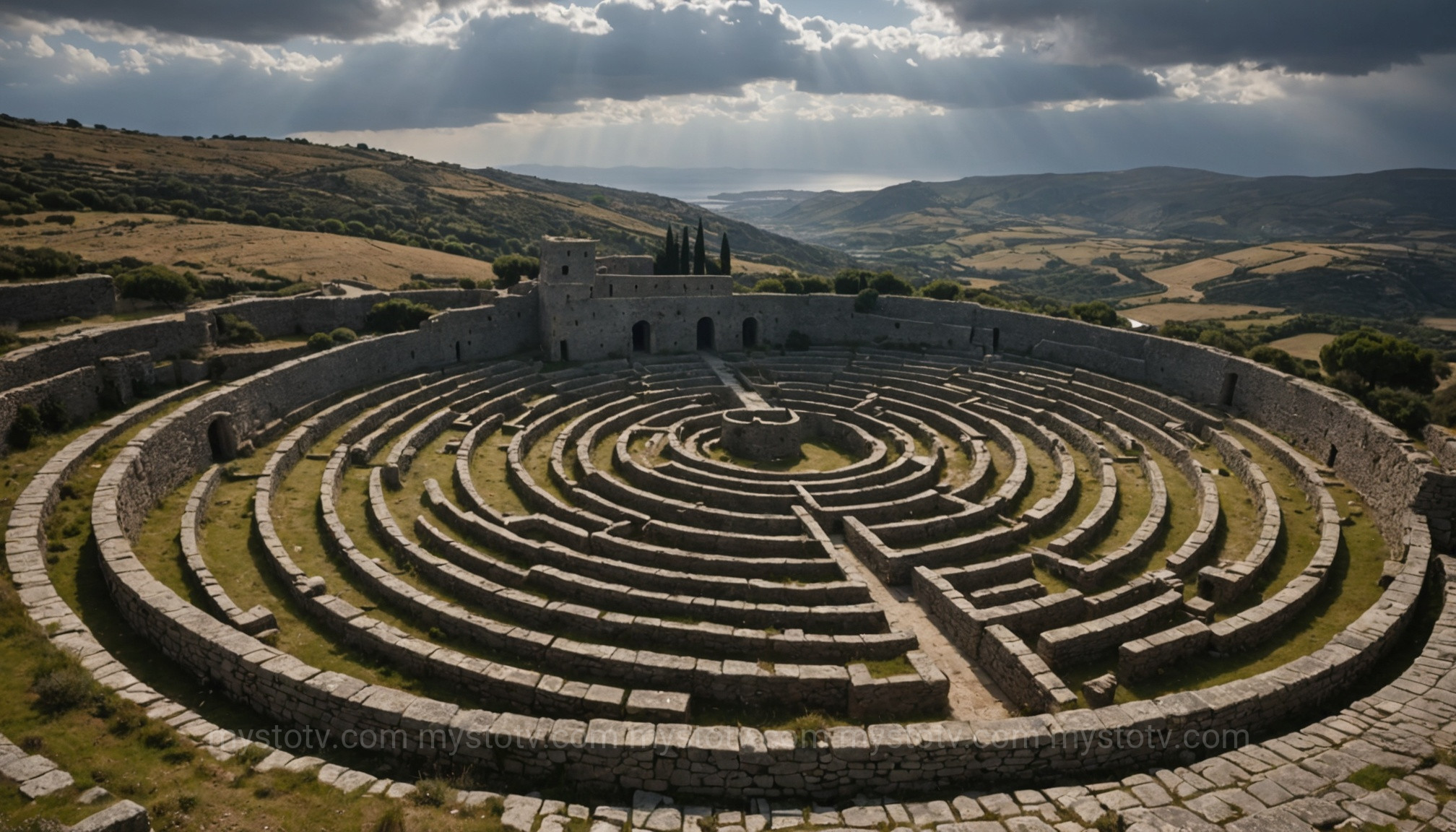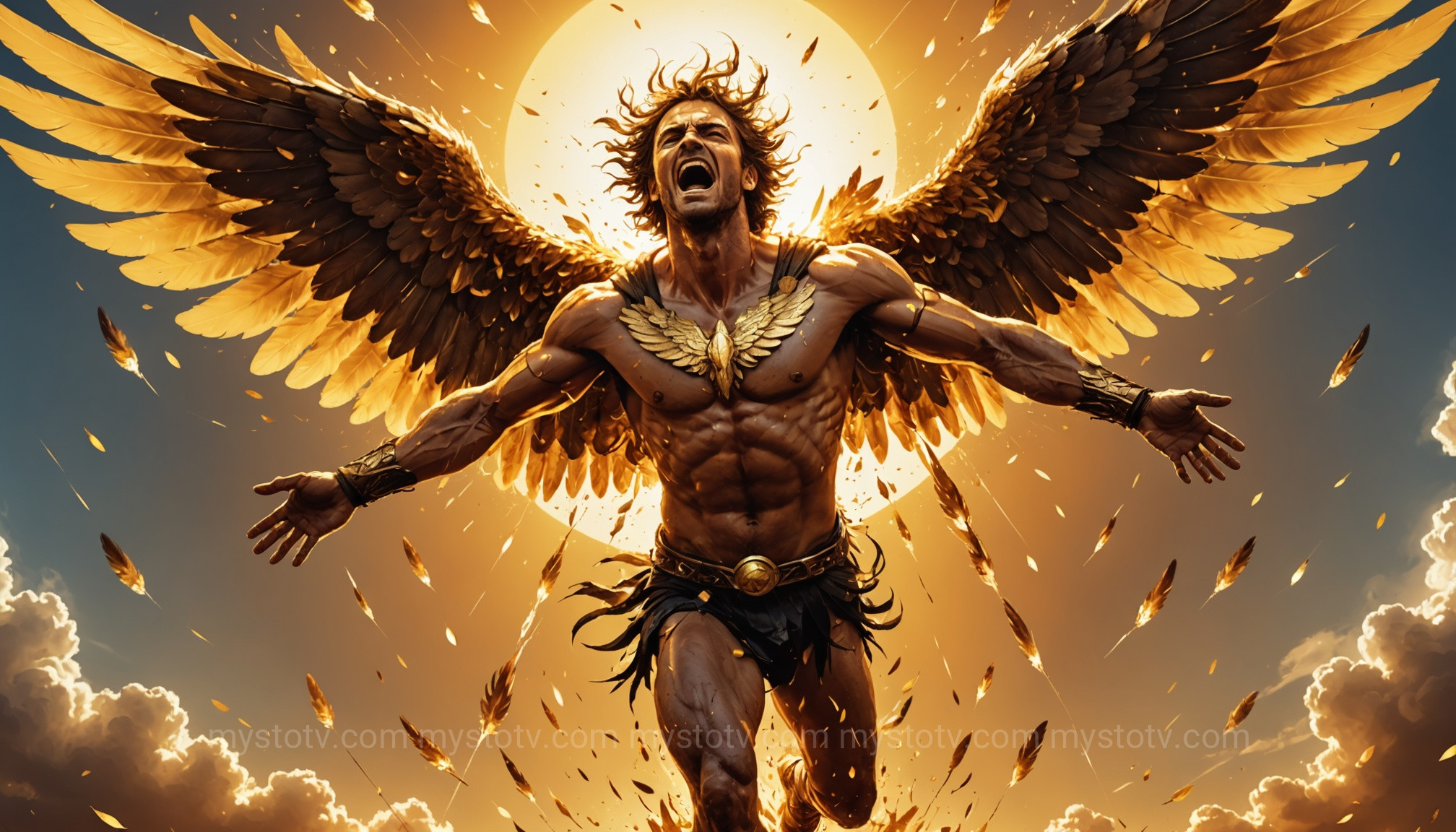I remember the first time I tried to build a complex piece of furniture from scratch without the instructions. I’d built a few simple bookcases and felt like I had the hang of it. "How hard can it be?" I thought, brimming with confidence. A few hours later, I was staring at a wobbly, misaligned mess, with a pile of "extra" screws on the floor. My ambition had outpaced my wisdom. This small-scale failure is a feeling many of us know well, and it echoes one of the most powerful and enduring fables from Greek mythology: the story of Icarus and Daedalus. It’s more than just a tale about flying too close to the sun; it’s a timeless warning about the delicate balance between genius and hubris, ambition and humility, a lesson that resonates as strongly today as it did thousands of years ago.
Contents
- 1 The Genius and the Monster: Unpacking the Story of Icarus and Daedalus's Origins
- 2 A Desperate Escape: The Ingenious Plan in the Story of Icarus and Daedalus
- 3 The Tragic Flight: Hubris and the Fall in the Story of Icarus and Daedalus
- 4 The Aftermath and Legacy: The Enduring Warning of the Story of Icarus and Daedalus
- 5 Frequently Asked Questions
- 6 Conclusion
- 7 References
The Genius and the Monster: Unpacking the Story of Icarus and Daedalus's Origins

To truly understand the tragic flight, we must first look to the ground. The story of Icarus and Daedalus begins not with wings, but with a maze. Daedalus was a figure of legendary genius, a master craftsman and inventor from Athens, celebrated for his ability to create marvels that blurred the line between artifice and life. His skill was so profound that it was said his sculptures could move and his creations could think. But genius often walks a tightrope with morality, and Daedalus’s path led him to the island of Crete, into the service of the powerful King Minos.
Daedalus: The Master Craftsman of Athens
Before Crete, Daedalus’s reputation in Athens was unparalleled. He was the descendant of a line of brilliant artisans, but his pride became his own trap. In a fit of jealousy over the burgeoning talent of his nephew and apprentice, Talos, Daedalus committed a terrible crime—he cast the boy from the Acropolis. Exiled for his sin, Daedalus fled to Crete, where his unmatched skills were quickly put to use by King Minos. This backstory is crucial; it establishes Daedalus not as a pure hero, but as a flawed, brilliant man whose actions have severe consequences.
The Labyrinth and the Minotaur: A Prison of Ingenuity
In Crete, King Minos faced a monstrous problem. His wife, Queen Pasiphaë, had given birth to the Minotaur—a creature with the body of a man and the head of a bull. To contain this beast and hide his family's shame, Minos commissioned Daedalus to construct an inescapable prison. Daedalus conceived and built the Labyrinth, a maze so complex and bewildering that once inside, no one could ever find their way out. The creator himself was said to have barely escaped after its completion.
Analysis: The Labyrinth is the first great irony in the story of Icarus and Daedalus. It is a monument to Daedalus's own genius, yet its purpose is dark and horrifying. It symbolizes how our greatest talents can be used to create our own prisons, both literal and metaphorical. Daedalus’s intellect, which should have been a source of light and progress, was co-opted to cage a monster, ultimately leading to his own imprisonment.
A Desperate Escape: The Ingenious Plan in the Story of Icarus and Daedalus

After the Athenian hero Theseus successfully navigated the Labyrinth (with help from Minos's daughter, Ariadne, who used a clue from Daedalus), an enraged King Minos turned on the inventor. Blaming Daedalus for the escape, Minos imprisoned both the craftsman and his young son, Icarus, within a high tower overlooking the sea. This act set the stage for one of the most famous escape plans in mythology, a central part of the story of Icarus and Daedalus.
The Imprisonment in the Tower
King Minos controlled the land and the sea, making any conventional escape impossible. For Daedalus, a man who could solve any puzzle, this was the ultimate challenge. Trapped in the very kingdom he had enriched with his inventions, he lamented, "He may thwart our escape by land and sea, but the sky is surely open to us." It was in this moment of desperation that his mind turned to a daring, unnatural solution: flight.
Crafting Wings from Feathers and Wax
Daedalus set about his work with the patience of a master. He gathered feathers of all sizes, from the smallest finch to the largest sea bird, which had drifted into their tower. He arranged them in overlapping rows, securing the larger ones with linen thread and the smaller ones with beeswax. He painstakingly crafted two pairs of magnificent wings, bending them into a gentle curve to mimic those of a real bird. Icarus, ever the child, played nearby, his innocent games a stark contrast to his father's life-or-death engineering.
The Father's Warning: "Fly the Middle Course"
Before they took to the sky, Daedalus fitted the wings on his son and gave him a solemn, critical warning. This moment is the moral heart of the story. "Let me warn you, Icarus," he pleaded, tears streaming down his face, "to take the middle way. If you fly too low, the damp from the sea will clog your wings. If you fly too high, the heat from the sun will melt the wax. Stay near me."
Analysis: Here, Daedalus’s genius again presents a double-edged sword. He creates the means of liberation, but it is an inherently fragile and dangerous one. The warning is not merely practical instruction; it is a profound philosophical plea for moderation, balance, and respect for natural limits—themes that are central to Greek thought. It’s the wisdom of experience (Daedalus) being passed to the impatient enthusiasm of youth (Icarus). You can see an echo of this in the later aftermath of the story.
The Tragic Flight: Hubris and the Fall in the Story of Icarus and Daedalus

With the father's warning still fresh in the air, the two leaped from the tower and into the sky. For a moment, the plan was a resounding success. The flight was the ultimate testament to human ingenuity. But this triumph would be short-lived, leading to the most famous and tragic element of the story of Icarus and Daedalus: the fall.
The Exhilaration of Flight
As they soared over the islands of the Aegean, fishermen and shepherds looked up in astonishment, mistaking them for gods. Icarus, tasting a freedom he had never known, was overcome with the sheer joy and power of flight. The wind in his wings and the world shrinking below him was an intoxicating experience. He felt invincible, godlike. The cautionary words of his father began to fade, replaced by the thrill of the moment.
Icarus's Fatal Ascent and the Sin of Hubris
Feeling bold, Icarus abandoned his father's side and began to climb higher and higher, drawn by a desire to soar to the heavens. This act is the classic definition of hubris: a dangerous overconfidence and excessive pride that challenges the gods or the natural order. He was no longer just escaping; he was reveling in a power that was not meant for mortals. He forgot he was a boy with borrowed wings and began to believe he was a god himself.
The Sun's Revenge and the Inevitable Fall
As he neared the blazing sun, the consequences his father had foretold came to pass. The fragrant wax that held his feathers together began to soften and melt. Icarus flapped his arms frantically, but he was only waving bare limbs. The feathers scattered, and he plummeted from the sky. He cried out his father's name as he fell, but it was too late. He plunged into the sea and drowned.
Analysis: Icarus's fall is a powerful metaphor for the downfall that follows arrogance. It’s a warning that ambition untempered by wisdom is destructive. The sun in the myth is not just a celestial body; it represents a divine, natural limit. By trying to reach it, Icarus was not just being disobedient; he was committing a transgression against the fundamental order of the universe, and he paid the ultimate price. His story teaches that true freedom lies not in limitless power, but in understanding and respecting our limitations. You can read more about this in the analysis of the father's warning.
The Aftermath and Legacy: The Enduring Warning of the Story of Icarus and Daedalus
The tragedy did not end with the fall. Daedalus, hearing his son’s cries, circled back in horror. He saw the feathers floating on the waves and understood what had happened. This final chapter cements the timeless and heartbreaking nature of the story of Icarus and Daedalus.
Daedalus's Grief and the Naming of the Icarian Sea
Filled with unimaginable grief and guilt, Daedalus searched until he found his son's body washed ashore on a nearby island. He buried Icarus and named the island Icaria in his memory. The body of water where his son fell is still known today as the Icarian Sea. Daedalus, the brilliant inventor who had defied a king and conquered the sky, was left to curse his own artistry. His greatest invention had led to his greatest sorrow.
The Myth's Timeless Message: Ambition vs. Arrogance
For millennia, the story of Icarus and Daedalus has been retold in poetry, painting, and prose. While it's often simplified as a lesson for children to obey their parents, its true meaning is far more profound. It is a sophisticated commentary on the human condition. It explores the tension between innovation and tradition, the dangers of unchecked ambition, and the wisdom in moderation. Daedalus represents the cautious inventor, aware of the risks of his own creation, while Icarus is the embodiment of youthful exuberance that tips into fatal arrogance. The myth does not condemn ambition itself, but rather the hubris that can accompany it.
Analysis: In our modern world of technological marvels—from artificial intelligence to genetic engineering—the myth is more relevant than ever. We are constantly "crafting wings," pushing the boundaries of what is possible. The story serves as a critical reminder to proceed with caution, to heed the warnings of potential consequences, and to never lose sight of our own humanity and limitations in our quest for progress. It asks us: Are we flying with the wisdom of Daedalus or the recklessness of Icarus?
Frequently Asked Questions
- 1. Why couldn't Daedalus and Icarus just escape by boat?
- King Minos had a powerful navy and controlled all the ports of Crete. Any attempt to escape by sea would have been quickly intercepted. Daedalus concluded that the sky was the only avenue of escape not patrolled by the king's forces, making the audacious plan to fly their only viable option.
- 2. What does 'hubris' really mean in the context of the Icarus myth?
- In this context, hubris is more than just pride or disobedience. It is the specific act of a mortal willfully ignoring divine or natural limits to gratify their own ego. Icarus's flight toward the sun was an act of hubris because he delighted in a power that was not rightfully his and, in doing so, he disrespected the natural order (mortals cannot fly to the heavens) and his father's wisdom. It was his belief in his own invincibility that led to his downfall.
- 3. Is Daedalus a hero or a villain in the story?
- Daedalus is a complex, tragic figure who is neither purely a hero nor a villain. He is a hero in his desire to escape tyranny and in his love for his son. However, his backstory includes the murder of his nephew out of jealousy, and his genius was used to create the monstrous Labyrinth. He is a quintessential example of a flawed protagonist whose brilliance leads to both triumph and tragedy, making the story of Icarus and Daedalus a deeply human and morally gray narrative.
Conclusion
The story of Icarus and Daedalus endures because it speaks to a fundamental truth of the human experience. We are all driven by a desire to soar, to achieve more, to push boundaries. This myth does not condemn that ambition. Instead, it offers a crucial piece of wisdom: our reach must be balanced by our grasp of reality. It reminds us that our greatest tools and innovations come with responsibilities and that true mastery lies not in flying to the sun, but in navigating the challenging, beautiful, and often perilous middle course. As we continue to build our own modern-day wings, the tale of the boy who flew too high remains the ultimate timeless warning.
References
- Ovid. Metamorphoses. Book VIII, lines 183-235. (c. 8 AD). An English translation can be found on Theoi Project. https://www.theoi.com/Text/OvidMetamorphoses8.html#5
- Theoi Project. "Daedalus." Aaron J. Atsma, 2017.
- Graves, Robert. The Greek Myths. Penguin Books, 1992.